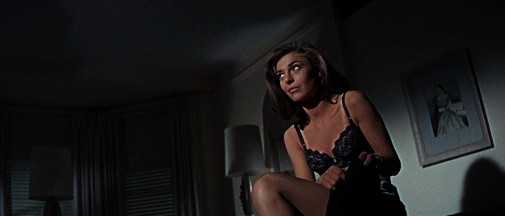
Some days ago, as part of our 1981 coverage, we talked about Katharine Hepburn's famous Oscar record. She's the only actor to ever have won four statuettes, all of them in the Best Actress category. In that piece, the idea was put forward that, despite her amazing career, the actress wasn't deserving of most of those victories. She might have merited four Academy Awards, but not for those particular works. We didn't explore who should have won in the years Hepburn triumphed, mainly because there isn't a lot of consensus about the matter. Still, while that's true regarding the 1933, 1968 (a tie!) and 1981 Oscars, the same can't be said about the 1967 awards. In that Best Actress race, one performance has shined brighter than all others, gaining a legendary status that goes way beyond the Oscars.
Since her movie is newly available to stream on Hulu, it seems like a good time to talk about Anne Bancroft as Mrs. Robinson in The Graduate…
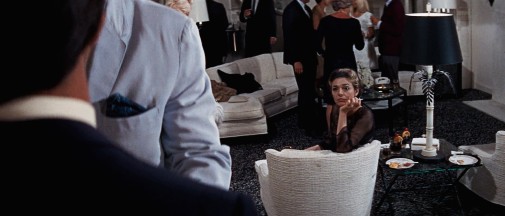
Mike Nichols' follow up to Who's Afraid of Virginia Woolf? is a zeitgeisty phenomenon whose cultural importance is difficult to overstate. Even those who have qualms about the picture's quality can't argue against The Graduate's place in movie history. Born out of a transitional period in Hollywood, the 1967 flick is a quarter-life crisis synthesized in celluloid, a portrait of Californian alienation that still resonates with the audiences of today. Its music is era-defining, its story unforgettable, its images galvanize the imagination and the characters seem both painfully real and like eternal archetypes bound to live forever as cinematic myths.
That's never truer than when we're talking about Mrs. Robinson, the middle-aged suburban housewife that seduces the college-aged son of family friends. Often clad in animal prints, perpetually made up with winged eyeliner and rarely found without a drink or a cigarette in her hands, she is the prototypical cougar who preys on the affections and virility of younger men. She's a vampire trying to suck the liveliness of another, the symbol of an older generation attempting to forcefully absorb the newer one. At least, that's the stereotype she's come to represent in the decades since the film premiered. Maybe that's who she is as she appears in the script adapted from a novel by Charles Webb.
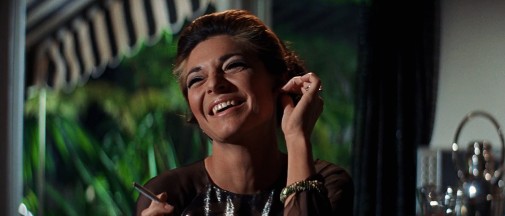
However, the smart lensing of director Mike Nichols and, more importantly, Anne Bancroft's canny performance elevate the character above that, mining her for inner depths and contradictions that aren't materialized on the page. Mrs. Robinson isn't a clichéd type or part of a young man's masturbatory existential crisis. She's a complicated woman whose bruised soul calls to us. That's quite visible from her first big sequence, one aggressive seduction act that's never as straightforward as it may appear. We initially see Bancroft's seductress in the background of a shaky shot following Dustin Hoffman's Ben Braddock through a party at his parents' house. He's sweaty and insecure, anxious beyond belief, his body as unstable as the camera. She, on the other hand, is still and demands our attention, anchoring the shot, and the movie in one fell swoop of minimal acting.
As she follows him into his bedroom under the pretense of looking for a bathroom, Mrs. Robinson's presence is preternaturally self-assured, so much so that she seems bored while cajoling Ben into giving her a ride home. At her place, that sense of insouciant tedium only becomes more apparent, her expression rarely changing from its monotonous state, even as her words become more suggestive and frank. A confession of alcoholism is uttered with calculated disinterest, a provocation from a master who wants to destabilize her companion. One feels that, whether the plan works or not, Mrs. Robinson will be indifferent about it.
Only when Ben starts to react panicky about the whole situation do we see something genuinely break through the stupor of middle-class intransigence – she's amused by him and she laughs. It's startling and it's sexy, her seduction working better than we have supposed. That same night, her attitude towards him goes from amused to impatient, from dry wit to the scolding countenance of a strict teacher dealing with a misbehaving student. Whether he knows it or not, Ben has taken the bait and so have we. From now on, even when she isn't onscreen, The Graduate is dominated by Mrs. Robinson and her dangerous allure.
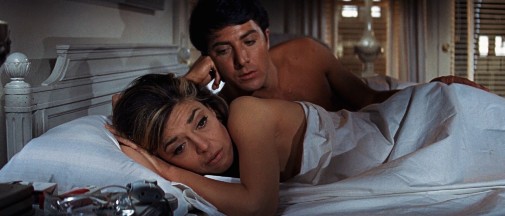
Later, after they've started an affair, Ben surprises her with a demand for further personal intimacy. Then, that mindless allure cracks and she lets us see more of what goes inside this woman's head. During a famous scene where a hotel room's lights keep being turned on and off, Bancroft turns her back to Hoffman, facing the camera as she allows the audience to see into a side of Mrs. Robinson she might not let anyone in her life observe. Consider how she speaks of studying art in college, how, for a moment, we get to see her not as a sultry mistress but as a mirror image of Ben's crisis. This all-consuming dissatisfaction stooped in regret is what may await him in the future. It's chilling.
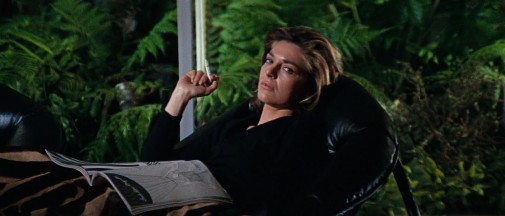
Even more upsetting is the way Bancroft plays her incandescent fury once Ben takes her daughter out on a date, breaking a promise he had made to his lover. If looks could kill, Dustin Hoffman would have left this Earth in 1967, that's for sure. Even then, that doesn't prepare anyone for the shattered despair the actress portrays when her sexual liaison is revealed to her progeny. Suddenly, it's as if something has emptied Mrs. Robinson's body of her soul, her spirit exorcised and leaving behind a catatonic shell that backs away into the corner of a white corridor. She is a black hole of utter despondence in the shape of a woman, an image that frightens and haunts.
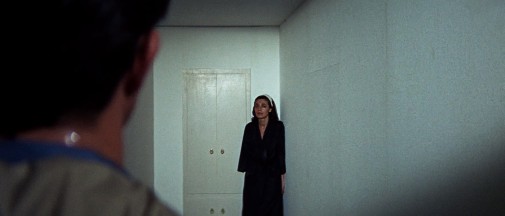
After that, Bancroft isn't in very much of The Graduate and the formal construction of her final moments doesn't allow the actress to give her character a full-rounded and satisfying arc. Still, it's difficult to imagine any other performer, including other candidates for the role like Ava Gardner, doing a better job. Bancroft's performance may be short, but it's virtually perfect, instantly iconic, and deserving of its fame. So sparse is her screen time that some say she should have competed as a supporting actress, where she'd be assured a win. Considering she lost to Katharine Hepburn in Guess Who's Coming to Dinner, those people may have a point. If it were up to you, would Bancroft have been victorious in 1967, and in what category?